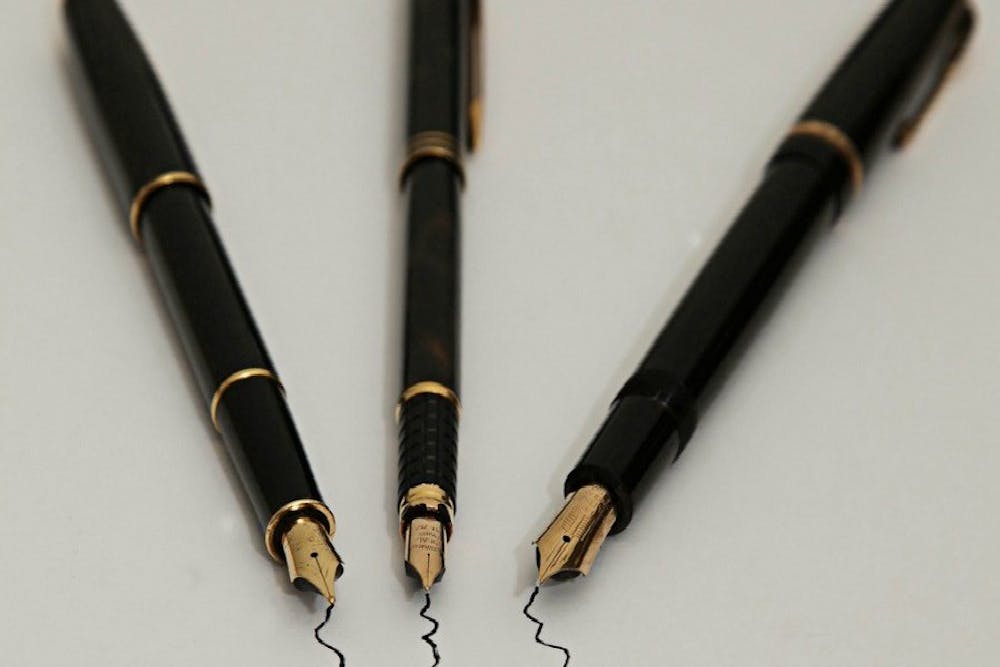Amanda's Approach
My hands felt small against the weight of the wide fairytale-sized doors. I sloped the spiraling stairs looking down at the time ticking on my wrist and suddenly felt very aware of the holes in my jeans. Because some buildings and some rooms and some people have a way of making you feel underdressed.
These are the worries that filled my nineteen-year-old mind seconds before, and all the way during, an interview with President Hodge. I looked around at the illustrious room adorned with more beveled M's than I had ever seen in one space and I looked into eyes of a man who has accomplished so much, yet whose voice was filled with a friendly echo.
This was a big moment for me, but I honestly don't remember what my conversation with President Hodge entailed or the subject of the article I was writing.
What stood out then, and still sticks out to me today when I think about it, were the words we exchanged after the tape recorder was shut off as he walked me out of his office, in the idle moments of chatter about my major and Miami and personal tidbits.
In my awestruck state, I forgot for a second that he had asked me a question, something about my future aspirations, and the silence told me I hadn't answered yet.
"Oh, I just want be a writer," I said while trying to untangle the light-blue thread dangling from my backpack. The words casually fell out of me in the same familiar order as they had so many times before.
Right then, he stopped me, his hands doing one of those wiping away mannerisms. With an encouraging, yet firm smirk scrolled across his face, his head shook. And then he said something more powerful and human and jarring than any impressive speech could convey.
"Well, not just a writer. And you don't want to be a writer," he said with a confident ease. "You're a writer."
This is one of those moments I carry with me when I'm overcome with self-doubt and when I'm worried about where I'll be a year from now. It may be a small, forgettable moment by many standards; but to me, it's a reminder that I'm not just a writer, a student, a girl, a young person, a journalism major - I'm not just anything. I'm something, no "just" about it.
If you think about it, "just" has the power to undercut any statement you make and set yourself up for an outlook of ambivalence. I bet you let the word "just" slip out more than you really consider.
If you tell yourself that you're just a college student, no one will take you seriously. If you say you're just a quiet person, you'll never speak up. If you let these "just" kind of thoughts creep into your mind and into your everyday conversations, you're championing the idea that you're average.
Saying "just" doesn't help you take steps forward; it's non-committal. When we say "just," we're holding back without giving ourselves a chance to stand out in that meeting or that job interview.
It doesn't matter if you're the most talented or if you have a long list of achievements backing you up, but describing yourself with any kind of "just" phrase is an automatic way to put yourself in the back of the line.
When we slip into these "just" kind of statements, we instantly sell ourselves short. It's like holding up a huge warning sign saying, "You shouldn't believe in me."
For me, it's easy to hide behind "just" in a warm blanket kind of way, to let its aura of self-preservation wrap around me. I like to avoid the risk of sounding too confident or too decided about something, I would rather rely on the thought that I'm just this or just that.
I fill in the gaps with "just" when I think I'm not good enough or cool enough or smart enough and when I compare myself to other people who seem to be more than enough. But then, I remember how it felt to be told that I'm not just something and how much of an impact that little word can have. And now I know it can have even more of an impact when I don't use it.

